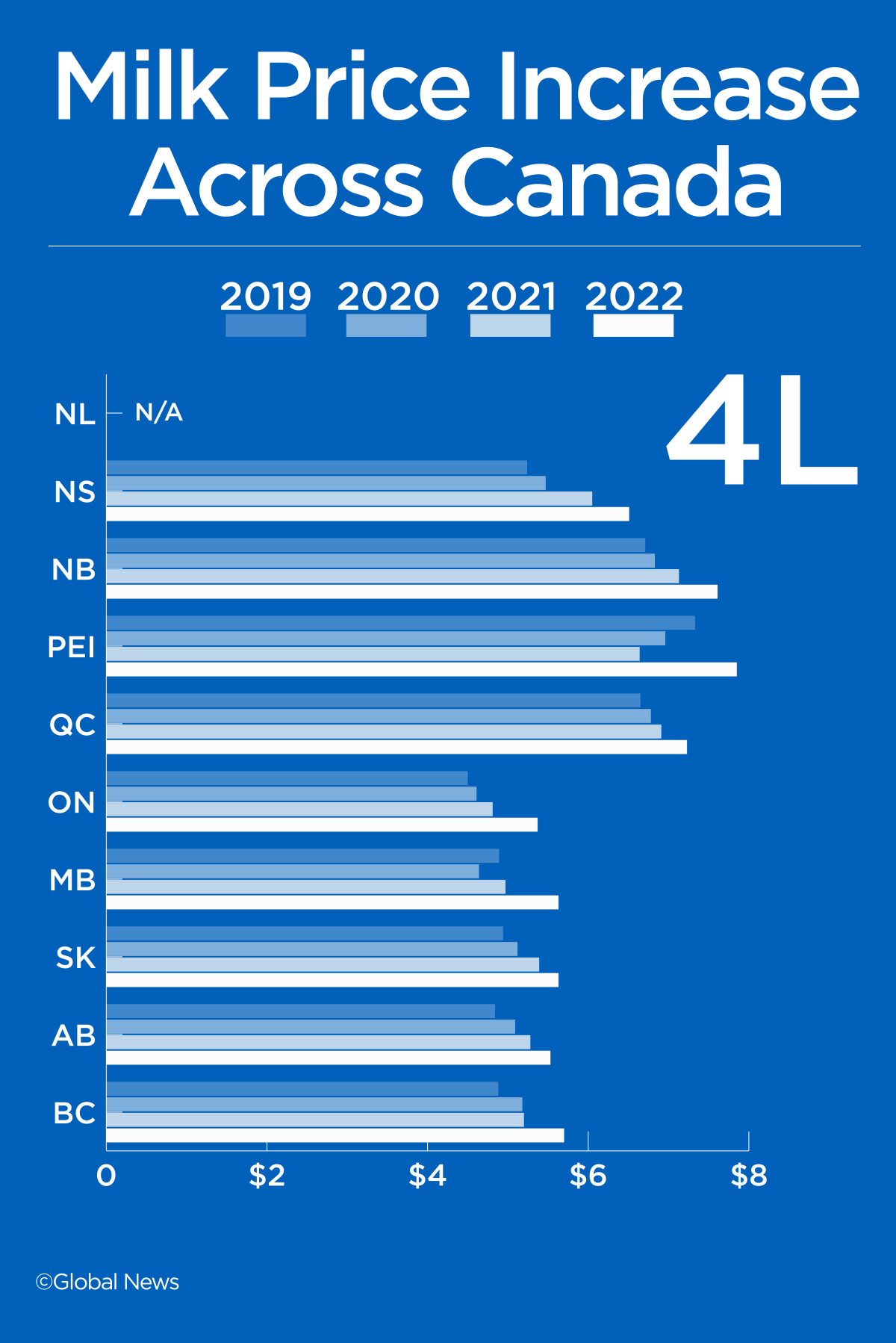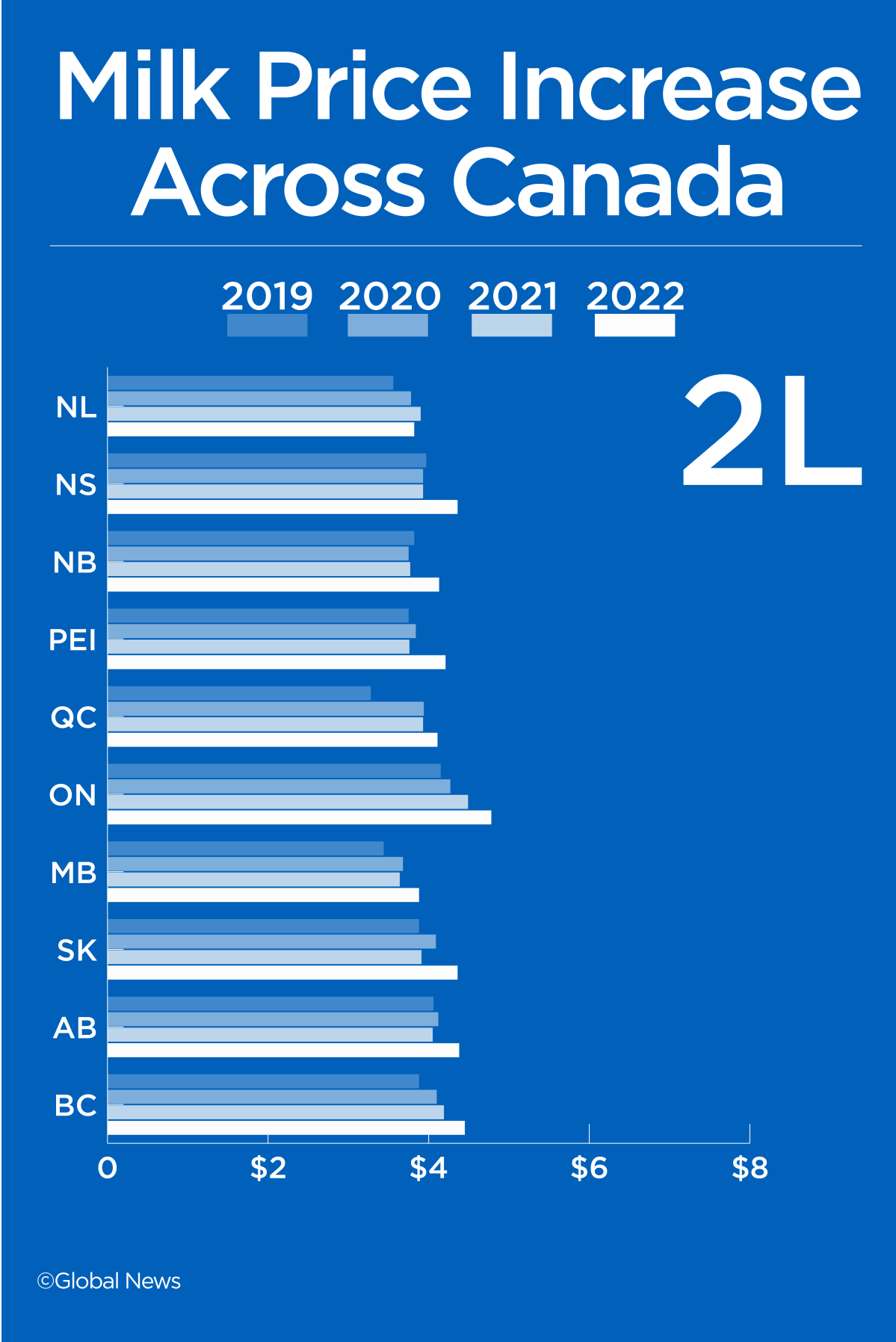The price of a pizza at Dino’s Pizza in Charlottetown hasn’t increased in about eight years. But after record-breaking price increases for dairy came into effect on Feb. 1, and given his reliance on cheese, owner Claude Ayoub sees no other choice.

“It’s tough. I’m trying to absorb most of the costs … but we’re definitely starting to feel it,” Ayoub tells Global News.
“I’ve already had to increase the price for some of my specials and we’ll be looking at normal menu items next.”
Charlottetown is now one of the most expensive places in Canada to buy milk at a store, with a four-litre jug now costing an average of $7.85, according to new data from digital marketing agency Field Agent Canada.
It comes as cafe and restaurant owners across the country warn the price of a cup of coffee or a slice of pizza may increase in the coming weeks, after the Canadian Dairy Commission in February implemented an 8.4 per cent rise in the price farmers are paid for the milk they produce.
Restaurant Brands International, the parent brand of Tim Horton’s, this week warned that menu price hikes were coming this year due to soaring inflation, which Statistics Canada says reached 5.1 per cent in January, its highest level since 1991.
Field Agent Canada general manager Jeff Doucette says the price of a four-litre bag or jug of milk has increased by an average of 9.5 per cent across Canada.
“We are seeing milk prices growing at almost twice the rate of inflation as dairies and retailers also pass along their own increases on top of the farm gate increase,” Doucette says.
Where is milk most expensive in Canada?
The Atlantic provinces and Quebec have historically been some of the most expensive places in Canada to buy dairy products from a supermarket, according to Field Agent data.
The company collects data from grocery stores across the country on the cheapest price of a four-litre jug and a two-litre bottle of milk. However, it’s important to note that data centered on Canada’s provinces and the territories were not captured by the study.
This year, the company surveyed 169 retailers between Feb. 7 and Feb. 16 to capture the effects of the farm gate hike.
It found that Charlottetown, Moncton, N.B., St. John’s, N.L., and Quebec City are some of the most expensive places to buy milk in Canada.
In 2018, a four-litre jug at Sobey’s in Charlottetown cost $7.29. That fluctuated until 2021, when it sank to $5.69 and then spiked to $7.79 this year. That’s a 37 per cent increase between June 2021 and February 2022.
Ayoub, who buys cheese direct from Saputo, one of Canada’s largest processors, says February’s increase and COVID-19 lockdowns have made it difficult to stay afloat in recent years.
However, he says soaring product costs began before the pandemic.
“In the last five years, it’s gone from $2 to put cheese on a pizza and now it’s $5.50,” he says.
“They use exactly the same excuse every time … that it’s for the farmers.”
However, he says dairy alone is not forcing him to increase his prices for the first time in almost a decade. There were also increased labour costs (Ayoub says he always pays $2 or $3 more than minimum wage) and a chicken wing shortage.

Get daily National news
“One month I lost $22,000 because I didn’t adjust the prices on wings,” Ayoub says.
In Moncton, a four-litre jug of milk costs an average of $7.61 – a 6.7 per cent increase from 2021. At Walmart, it’s now $7.79, up from $7.15 in 2021.
In St. John’s, historically one of the most expensive places to buy milk because Newfoundland and Labrador doesn’t stock four-litre bags, the price of a two-litre bottle is now the cheapest in the country, costing an average of $3.82. Unfortunately, however, that still makes the equivalent of four litres $7.64.
In Halifax, prices for four-litre jugs increased on average 9.2 per cent to $6.51. At Sobey’s, the price went from $5.68 to $6.89 – a 21.3 per cent hike.
Sylvain Charlebois, director of the Agri-Food Analytics Lab at Dalhousie University, says prices increased more than the 8.4 per cent farm gate hike because further increases are added along the supply chain, by processors and retailers, due to their own rising costs.
He says provincial price variations, such as those seen in Atlantic Canada, occur because farms are smaller.
“The cost of produce and milk is typically higher when you have smaller and less efficient farms,” he says.
Where is milk cheapest in Canada?
The cheapest prices for milk in the country are currently $4.65 at two Costcos in Toronto and a Walmart in Winnipeg. However, these were the 2021 prices, so it’s unclear if they simply have not been raised yet.
The cheapest two-litre bottles can be found in Laval, Que. (Maxi: $2.08), Circle K in St John’s ($3.15) and Scarborough FreshCo ($3.29) in Toronto. The most expensive was found at a Circle K in Halifax ($5.85, the same price for their four-litre jug).
In Canada’s most populated provinces, milk prices increased by between 10 and 15 per cent in 2022.
In Toronto, the price jumped to $5.39 from $4.69 for a four-litre bag at most of the city’s major grocery store chains: NoFrills, Loblaws, FreshCo, Metro and Walmart. That’s a 14.9 per cent increase.
It now costs, on average, $5.55 to buy a four-litre bag of milk in Toronto (a 13 per cent increase since 2021). In Ottawa, it’s $5.31 (a 12.7 per cent increase).

Historically, price increases have been smaller in Ontario. In 2018, the price for a four-litre jug was $4.27 at most of Toronto’s supermarkets.
One of the city’s pizza shop owners, who did not want to be named, said “prices literally went up overnight” in February.
“A case of 10-kilogram cheese went from $125 to $150.… It’s pretty crazy stuff, especially (for) a new business owner to try and navigate something so out of your control.”
Similar increases were seen in B.C., with it now costing on average $5.44 in Langford/Victoria for a four-litre jug and $5.85 in Burnaby/ Coquitlam – increases of about 10 per cent since 2021.
In other provinces, 2022 price increases were smaller than the farm gate hike. Laval increased prices an average of 2.9 per cent (to $7.16) and Regina just 3.7 per cent, to $5.63.
Why is milk so expensive in Quebec?
Quebec regulates its dairy prices, meaning there is little fluctuation between grocery stores. However, it also means that price increases each year are smaller than elsewhere.
In 2019, a four-litre jug of milk cost $6.58 and a two-litre bottle about $3.75 in Quebec City. In 2022, the price for a four-litre jug is $7.25 (a 5.7 per cent from 2021) and $4.10 for two litres.
But the increase hasn’t gone unnoticed for cafe owners.
Mathilde Plante, general manager of La Maison Smith, which operates seven cafes in Quebec, says she will increase menu prices to account for what she says is a 10 to 15 per cent price hike on dairy from her supplier.

While she does not yet know what that price increase will be, she said it “won’t be 10 or 15 per cent” and the cafe will absorb some of those costs.
A latte at La Maison Smith currently costs $5.
Plante says the cafe does not charge extra for non-dairy milk alternatives such as oat or almond milk, because they prefer to give people a choice – but also because the prices for non-milk alternatives are now almost the same as dairy.
Dairy prices could climb even further in 2022
Questions to Walmart, Loblaw’s and Sobey’s went unanswered.
Loblaw’s forwarded queries to Michelle Wasylyshen, national spokesperson for the Retail Council of Canada, who said retailers faced higher costs as prices along the supply chain also increased.
“Dairy is not unique in this regard. Grocers – and hence consumers – have been facing unprecedented price increases from a wide range of food processors and manufacturers,” Wasylyshen says.
However, Charlebois says Canada’s system of supply management – which maintains a fixed price for farmers to protect them from market volatility – could be to blame.
He says fixed prices prevent farmers from being competitive and encourage inefficiency.
“Supply management does provide stability, and to a certain extent, it’s all about food sovereignty, so we’re able to produce what we need in Canada,” he says.
“The challenge, though, is that we’ve never actually asked ourselves what kind of industry we want and if we want a competitive industry.”

Charlebois says milk is often considered a “loss leader” for supermarkets, meaning prices are lower to get people through the door. He says higher increases will be seen on other dairy products such as cheese, butter and yogurt.
“(Milk) isn’t where the dairy industry actually makes its money. It’s mostly in dairy products,” he says.
“We’re expecting dairy products to become even more expensive as we go through the winter into the spring.”
Questions to some of Canada’s most popular cafe and pizza brands, such as Second Cup, Restaurant Brands International on behalf of Tim Hortons, Pizza Pizza, 241 Pizza and Pizza Nova, on whether menu prices would be increased due to the dairy price hike, went unanswered.
Starbucks Canada also declined to answer questions.










Comments
Want to discuss? Please read our Commenting Policy first.